Next class is on Wednesday 6/17.
Everyone read their Lewis. And love it. Catcha later.
Beyond Personality – The Surviving BBC Audio
Published May 15, 2009 Thoughts and Commentary 4 CommentsThe BBC website on CSL has the only remaining BBC session, spoken on March 21, 1944, which eventually became Beyond Personality, and further became Book Four of Mere Christianity.
Great listen. Not word for word what appears in BP or MC – so an interesting listen while reading along. I’m still working on checking how it all refers, but he starts with pretty much the exact content from “Time and Beyond Time” in both BP and MC.
Listen here.
Good Reads and Revised Syllabi (v2.0)
Published May 15, 2009 Class Admin , Thoughts and Commentary Leave a CommentGood Reads
Yodles. I read Lewis’ “Talking About Bicycles” today and in so doing, learned a little more about myself. Spectacular. Also notable: “Equality” – I think a good read for anyone looking for a little more to go along with “Membership” which is now available on the “Essays for Discussion” page. Come to think of it, “Screwtape Proposes a Toast” is also quite fantastic, and on topic with Membership and Equality. I’ll see if I can get these up on the site so folks can do some extra background reading (of course not required) for some more hashing out the ideas.
And this is where Clivey Jack gets even a little more controversial. Do you like democracy? Do you like equality? Do you know what they mean? (Or, at least, what Clivey thinks they mean/imply???) YERINFERATREAT!!
Syllabus, reflecting recent changes
CLICK HERE for the PDF
What is so lovely about this piece is that it’s hardly about “Learning in War-Time” at all. It seems like the war (WWII in this case) was just a good stopping point for a scholar to consider life’s meaning, and how his own vocation fits into that. I’m very excited to hear about everyone’s thoughts on this one.
Great class last night discussing Lewis’ conversion to Christianity. Some myth, a gust of wind, long conversations, plumes of tobacco pipe smoke, and of course, the sidecar. Tolkien’s lovely quote sums it up for me:
Friendship with Lewis compensates for much, and besides giving constant pleasure and comfort, has done me much good from the contact with a man at once honest, brave, intellectual—a scholar, a poet, and a philosopher—and a lover, at least after a long pilgrimage, of Our Lord.
Admin stuff:
1. Audio from the three first classes is posted under “Lecture Audio” above.
2. I’m also working on getting some tunes that have been inspired by Lewis available as well. More to come on that stuff.
3. I updated the “Structure of the Weight of Glory” below with the detailed outline I created. It’s not too interpretive, but I’m interested in hearing from others on “the upshot” of TWOG.
4. Read some Lewis!
5. Read some Sayers! (on the sort of education that Lewis enjoyed – based on Medieval educational principles)
The Structure of “The Weight of Glory”
Published May 5, 2009 Essays , Thoughts and Commentary 35 CommentsI wanted to offer some really brief thoughts on the structure of “The Weight of Glory” – the essay we’re discussing this week in class (5/6). And though it might seem forced or tedious, I’d like to go through the entire essay together in class. (UPDATE 5/7 – see outline below)
I’ll spend the first 20-30 minutes chatting about Lewis’ conversion (really, it was a “reversion”) to Christianity, which was really just a hop skip and a jump away from his decade-long dive into theism.
Then, we’ll spend the rest of the class on this essay, which some have found a little challenging for our first piece out of the gates.
Here are some ideas to consider if you’re interested:
After having gone through it patiently, taking note of the ordered progression in thought, I am even more compelled by his beautiful message in this address. I’m looking forward to what everyone else is thinking as well. Maybe after class we can continue discussion here on the blog…
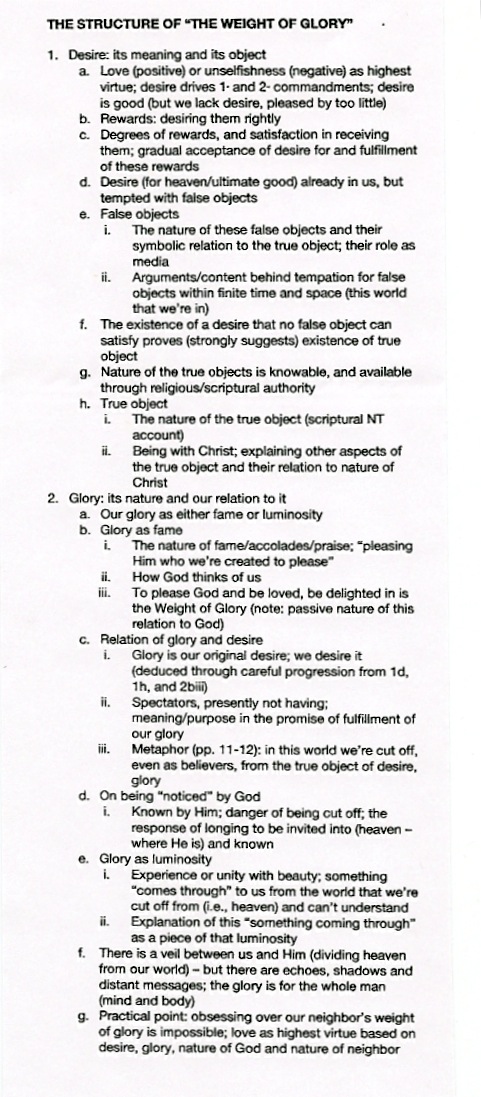
Friends,
We’ll be continuing in Lewis’ address “The Weight of Glory” at our next class meeting on May 6. This will give us some time to go through the entire piece together, which will definitely help us all gain a better understanding of it all! It’s posted as a PDF under “Essays for Discussion” up top.
Last Wednesday at our first class meeting (4/22), some really great discussion emerged around Lewis’ concept of “Joy” – and there is a lot going on there. This is a seemingly constant recurring theme in Lewis, which is understandable considering the sort of experience he is trying to describe.
Yesterday, Scott and I were chatting about the distinction between Lewis’ “Joy” – happiness, pleasure, and then added a component of grief. He asked if we could provide some basic definitions of the concepts, which I’ll try to do here. The conversation was helpful for me, and served to clarify some of the issues in discussing these things.
1. The difficulty. These concepts are inherently hard to understand and describe, let alone box them up for quick consumption. This is in no wise a bad thing; if they were easy, we wouldn’t be so apt to call Lewis a literary or intellectual master. And such is our experience, as Lewis points out: this is a longing for a longing. A deep desire to feel “that particular deep desire.”
2. Jack’s many terms for it. As for Lewis’ word choice and definitions, again – hard to pinpoint. But I hope this clears up some confusion (it did for my own): When Lewis says “Joy” (the uppercase kind) he does not mean joy. He means something very specific, and using a word like joy is the best way he thought he could identify it in Surprised By Joy (1955). Note that he discuss this concept “Joy” elsewhere in his writing without even referring to it as such. He calls it “Romantic experience” and “sweet desire” in The Pilgrim’s Regress (1933). He calls it “the inconsolable secret” and “longing” in “The Weight of Glory” (1941). He almost surely calls it other things elsewhere.
The point: the terminology is entirely practical: to try to help us get it!, because he is suspicious that “the experience of longing” which comes through all sorts of media (poetry, memories, inanimate nature, buildings, etc.) is a common human experience.
3. “Joy” is different; wholly singular. What this means is that what we normally think of as “joy” (lowercase, general non-Lewisian usage) is not at all what Lewis is thinking of when he says “Joy”. And as I mentioned, because of it’s difficulty, it’s more likely that we’ll spend our entire lives (as Lewis did) trying to clarify our understanding of the experience (and more importantly living life in light of it, having paid it due attention) than figure it out in 9 class meetings. Note also that we should not necessarily assume that Lewis “Joy” is anything like the biblical meaning of “joy” (see 4C and 5 below).
But what a lovely and worthwhile place to start!
4. What it’s not. Remember, the standard for this is what Lewis is talking about; we’re just trying to understand his claims. After we understand, then we can disagree if that’s your cuppa joe.
A. It’s not “happiness” – a positive feeling or emotional state, associated with physical or non-physical pleasure, or favorable circumstances; note that under this same term, there is a wide range of intensity, from winning a board game to winning the super bowl, to winning the fair maiden’s hand in marriage.
B. It’s not “sadness” or “grief” – a negative feeling or emotional state, associated with physical or non-physical pain, unfavorable circumstances; note, however, that “the Experience” Lewis describes is one of desire, yet not having, which in other circumstances would produce sadness – yet this is not the case with the longing that Lewis is thinking about.
C. It’s not “joy” – a (lowercase) Christian virtue/disposition/experience that does not depend on the circumstantial events of one’s life, whether happy or sad; note that other virtues can serve to support this experience, such as peace, patience, gentleness, self-control, etc.; I would closely associate “joy” with “hope”; the sentiment of “joy” doesn’t necessarily include “longing” or “deep desire” or “inconsolable secrets.”
This last “What it’s not” is controversial – I need to think more about it, and expect that plenty of people would disagree with me about it. Certainly it’s tempting to think
5. Afterthoughts. Last week, two minor points came up that I wanted to follow-up on. That’s the etymology of the word “happy” and biblical references to “joy” (lowercase).
A. “Happy” does in fact contain a subtle reference to circumstance, and comes from Old English (and originally Old Norse “happ”) meaning “luck”; same roots as “happen” or “perhaps” etc. (References: OE, myEtymology, Dictionary.com)
B. “Joy” (lowercase) in the bible means something different than Lewis’ concept. (Again, a reason to maybe not call it that!, but he does though.) Here’s a decent overview of the concept of “joy” (lowercase) in the Old and New Testaments. There is a covenantal distinction though: joy in the OT is “exultant gladness” (which somehow makes perfect sense to me), and joy in the NT is:
“no mere gaiety that knows no gloom, but is the result of the triumph of faith over adverse and trying circumstances, which, instead of hindering, actually enhance it”
A notable NT reference that almost suggests a meaning similar to Lewis’:
Looking unto Jesus the author and finisher of [our] faith; who for the joy that was set before him endured the cross, despising the shame, and is set down at the right hand of the throne of God. – Hebrews 12:2
Here is the class syllabus; click here for the PDF of the syllabus.
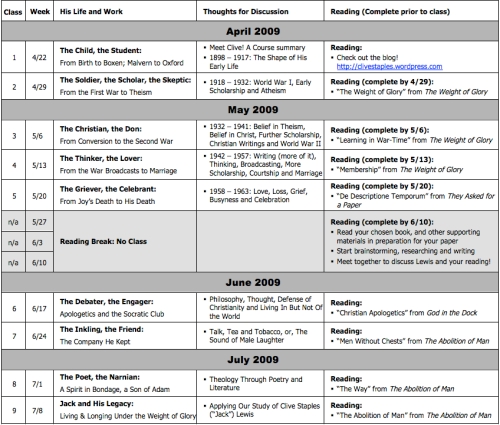
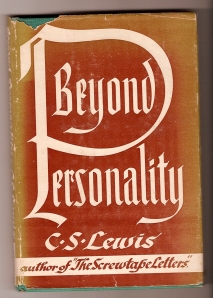
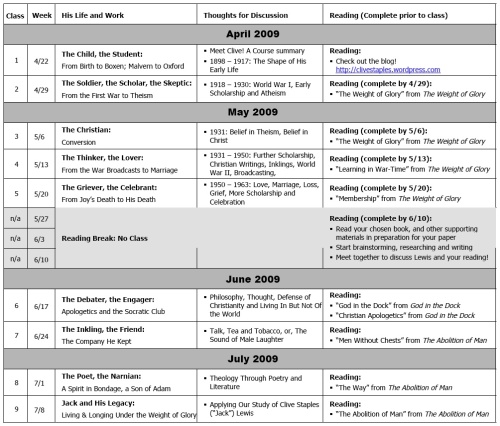
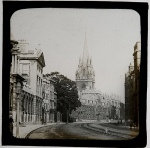
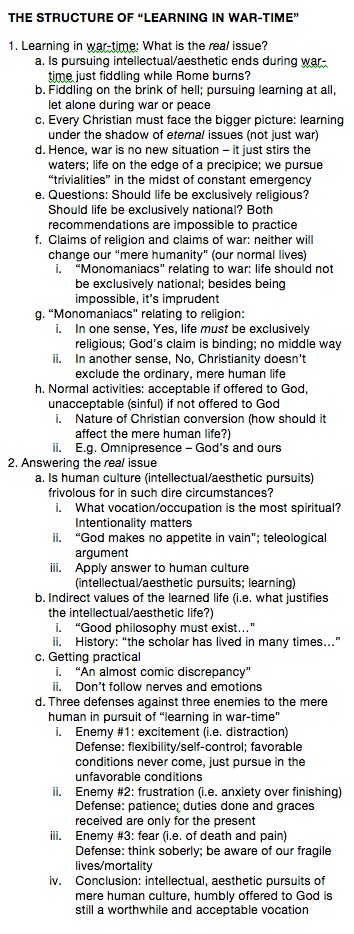

Back to School!… for summer? YES!
Published June 16, 2009 Class Admin , Thoughts and Commentary Leave a CommentDearest Clive-o-philiacs,
I’m very excited to be announcing the resumption of our Wednesday meetings, starting in just two days! 6/17 marks our reunion and the end of a 4 week break. How we’ve got along without one another, I do not know.
Now, we’ve only got 4 classes left:
1. 6/17: THIS WEEK! The Debater, the Engager: Apologetics and the Socratic Club (reading: “Christian Apologetics”)
2. 6/24: The Inkling, the Friend: The Company He Kept (reading: The Abolition of Man, Ch. 1)
3. 7/1: The Poet, the Narnian: A Spirit in Bondage, a Son of Adam (reading: The Abolition of Man, Ch. 2)
4. 7/8: Jack and His Legacy: Living & Longing Under the Weight of Glory (reading: The Abolition of Man, Ch. 3)
We’ve finished our biographical sketch of his life, and now we’ll be addressing more topical issues, as well as digging into the texts for more of the class. I believe I mentioned that in addition to “Christian Apologetics” (this week’s essay), I’d make another brief essay available, “God in the Dock”; well, instead of having you read the whole thing, I just want to pass on the most important paragraph of the piece (the essay otherwise is a summary of “Christian Apologetics”). So, even if you read nothing else, ponder these words before class:
These few sentences depict an acute understanding of the task for the modern Christian (including us today). If Lewis is correct, we have a lot to reflect on about how we think about God, and about how the world we are commissioned to serve thinks about God.
I’m looking forward to our discussion this Wednesday. In many ways, it will be one of our most important.
Phileo,
Evan